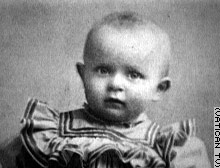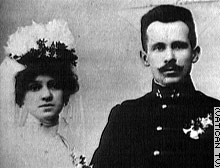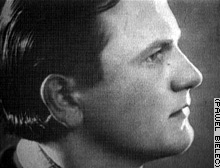The early years: An unhappy childhood
 |

Karol Jozef Wojtyla was born in Wadowice, Poland, in 1920.
Story Tools
|
(CNN) --
Before he became the leader of the Roman Catholic Church, Pope John Paul II was Karol Jozef Wojtyla.
Friends in Wadowice, a town of 8,000 Catholics and 2,000 Jews 35 miles southwest of Krakow, called Wojtyla "Lolek." He was born in 1920, the second son of Karol Wojtyla (pronounced voy-TIH-wah) Sr., a retired army officer and tailor, and Emilia Kaczorowska Wojtyla, a schoolteacher of Lithuanian descent.
The Wojtylas were strict Catholics but did not share the anti-Semitic views of many Poles. One of the young Wojtyla's playmates was Jerzy Kluger, a Jew who remembers youthful soccer games, Catholics versus Jews.
But in the predominantly Catholic town of Wadowice, the Jewish population was small. Kluger said Wojtyla would volunteer to help even the odds on the playing field.
"There usually was not enough Jews, so somebody had to play on the Jewish team and he was always sort of ready, you know," Kluger said in a 2003 interview.
For the time and place, the friendship between the two men was unusual but they formed a lasting bond. Kluger would later play a key role as a go-between for John Paul II and Israeli officials when the Vatican extended long-overdue diplomatic recognition to Israel.
Indeed, Wojtyla became the first pope to visit a synagogue and the first to visit the memorial at Auschwitz to victims of the Holocaust. In ending the Catholic-Jewish estrangement, he called Jews "our elder brothers."
Losing his mother
As a schoolboy, Wojtyla was both an excellent student and an athlete who skied, hiked, kayaked and swam in the Skawa River. But death hovered over the family, making itself felt first when an infant sister died before Wojtyla was born.

| |
Wojtyla lost his mother in 1929 and his father in 1941; neither lived to see him become a priest.
| |
|
It struck again in 1929 when his mother died of heart and kidney problems, just a month before his ninth birthday. And when he was 12, his 26-year-old brother Edmund, a physician in the town of Bielsko, died of scarlet fever.
"I would say he lost his childhood at 12, when he lost his brother," said Szczepan Mogielnicki, a childhood friend of Wojtyla, in a 2003 CNN interview. "There was no youthful folly in him. Even when he played sports, he was very concentrated, but of course, he had a lot of passion. He was a very noble person, and he expressed things in a very noble way, but there was no folly."
Wojtyla himself had two near misses with mortality in his youth. He was hit once by a streetcar and again by a truck in 1944 while a college student. The injuries left the otherwise robust pope -- 5-foot-10 1/2 inches, 175 pounds in his prime -- with a slight stoop to his shoulders that was particularly noticeable when he was tired.
Even as an adult he was beset by physical difficulties, including a dislocated shoulder, a fractured femur, hip-replacement surgery, the removal of a precancerous tumor from his colon and an attempt on his life by a gunman whose two bullets wounded the pope in the abdomen, right arm and left hand.
Wojtyla and his father lived in a spartan, one-room apartment behind the church, and the father devoted himself to raising his son. He sewed his son's clothes and had the boy study in a chilly room to toughen him and develop his concentration.
But the father didn't forget about play. A friend remembers entering the Wojtylas' apartment and finding father and son playing soccer with a ball made of rags.
Poetry, religion and theater
Wojtyla's passions in those early years were poetry, religion and the theater. After graduating from secondary school in 1938, he and his father moved to Krakow where he enrolled at Jagiellonian University to study literature and philosophy.

| |
Acting was one of Wojtyla's interests.
| |
|
He founded an underground theater company, writing and acting in plays that frequently dealt with oppression, and participated in poetry readings and literary discussion groups. Friends say he was an intense and gifted actor and a fine singer.
"He was really talented," said Danuta Michalowska in a 2003 CNN interview. "He was wise not only in the usual meaning of the word, but also in the artistic sense. He knew what to do with a word. He knew how to say it."
After the Germans invaded Poland, he escaped deportation and imprisonment in late 1940 by taking a job as a stonecutter in a quarry.
A few months later, in February 1941, Wojtyla's 61-year-old father died, leaving his dream of seeing his son commit to the priesthood unfulfilled. The pope has said that his father once told him, "I will not live long and would like to be certain before I die that you will commit yourself to God's service."
It was another 18 months, however, before Wojtyla began studying at an underground seminary in Krakow and registered for theology courses at the university, even though the Nazis were actively killing priests who opposed them.
"The rest of us, we were like most intellectuals at the time, practicing Catholics, but our Catholicism was rather superficial," Michalowska said. "There was a distinct difference between him and us."
He continued his studies, acted and worked in a chemical plant until August 1944. But when the Germans began rounding up Polish men, Wojtyla took refuge in the archbishop of Krakow's residence and remained there until the end of the war.
He was ordained in 1946 in Krakow and spent much of the next few years studying -- he earned a master's degree and doctorates in theology and philosophy -- before taking up priestly duties as an assistant pastor in Krakow in 1949.
Next - The priesthood years
Back to the top
|